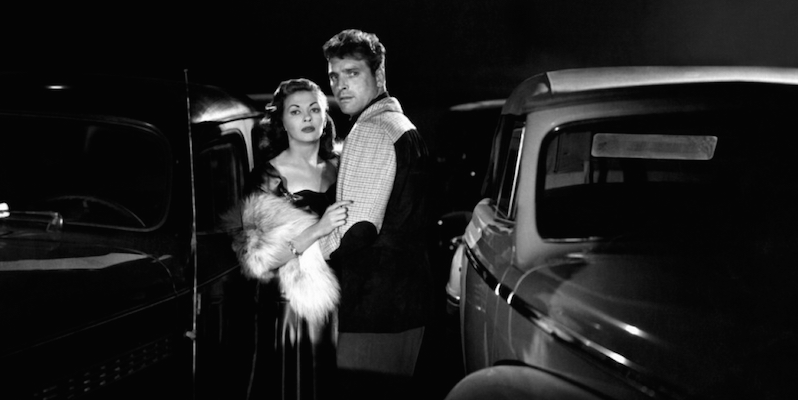Criss Cross is a superbly taut film noir, a 1949 drama that unfolds with the inevitable downward spiral of ancient tragedy. Its doomed characters are prisoners of a hopeless struggle for freedom, caught in the web of their transgressive desires.
Steve, whose tortured soul and desperado’s ambitions are beautifully rendered by Burt Lancaster, works for an armoured truck company. In a plan that feels doomed from the start, and in order to free Anna, the woman he loves passionately, from the clutches of the coolly ruthless gangster Slim Dundee (Dan Duryea), Steve offers himself as the inside man who’ll make an otherwise impossible heist pay off. In a tangle of threats, deals and betrayals, the more than double cross of the title plays out with twists and turns that surprise until the very end. The script, based on Don Tracy’s novel, was the work of recently-rediscovered Brooklyn novelist Daniel Sachs, who was a keen observer of human character, and a wizard with story-telling and dialogue. The minor roles, from the all-knowing and fatalistic barman to the hard-drinking woman who props up the bar – helpless witnesses to the others’ hurtling descent into the abyss – are much more than extras or walk-on parts: each of them adds humanity and texture to the archetypal drama that moves inexorably to defeat and violent death.
There is no hint of redemption here. This could be one of the psychological keys to noir – the darkness that lurks in every human soul, when driven by irrational passion. The femme fatale and temptress, Anna, whose psyche is as mixed-up as it gets, victim as much as manipulator, is the perfect vehicle for Yvonne de Carlo (pictured below), who isn’t as celebrated as she deserves.
In a form that Billy Wilder would use again in Sunset Boulevard, which was made the year after Criss Cross, the story is told through a series of flashbacks. The voice-over narrative – that was later borrowed by many of the French nouvelle vague who were devoted to American noir – is a staple of the genre, referenced in the opening of Ridley Scott’s Blade Runner (1982). This inner monologue provides a kind of interiority that enhances the psychological nature of these tragic thrillers, connecting the subjective essence of the story most intimately to the audience. Film noir is not just a visual aesthetic, brought to sunny California as an antidote to the brightly lit escapism and fun of so much Hollywood entertainment. Those who shaped the genre came for the most part from Central Europe and Germany, nurtured on the fierce contrast between light and dark, the almost painterly exploitation of shadow and silhouette, the low-angle and dramatically canted shots in the expressionist silent cinema that came out of Berlin. They were also for the most part Jewish, the inheritors of a cultural tradition steeped in a tragic view of life and a sceptical view of redemption. The anti-heroes and heroines of noir tread a path through a dark labyrinth in which goodness is fleeting, and something much less wholesome the norm.
Film noir is not just a visual aesthetic, brought to sunny California as an antidote to the brightly lit escapism and fun of so much Hollywood entertainment. Those who shaped the genre came for the most part from Central Europe and Germany, nurtured on the fierce contrast between light and dark, the almost painterly exploitation of shadow and silhouette, the low-angle and dramatically canted shots in the expressionist silent cinema that came out of Berlin. They were also for the most part Jewish, the inheritors of a cultural tradition steeped in a tragic view of life and a sceptical view of redemption. The anti-heroes and heroines of noir tread a path through a dark labyrinth in which goodness is fleeting, and something much less wholesome the norm.
Criss Cross is very much cinematographer Franz Planer’s movie, a master of his craft whose works created, among others, the sombre universe that graced so many thrillers of the 1940s, and provided the perfect stage for dramas in which flawed psychology, erotic desire and sadism play such an essential role. Robert Siodmak, one of the great American directors of the period, knew how to pace this kind of emotional roller-coaster. He was also a fine director of actors, expert at evoking the simple humanity at the heart of the most tragic stories. He cut his teeth – along with other future émigrés to Hollywood, Edgar G Ulmer and Billy Wilder – on the 1930 German silent People on Sunday, a film that's not just visually stunning and poetic, but celebrates the beauty of ordinary humanity.
This new 4K restoration brings out the best of Planer’s brilliant cinematography. The Masters of Cinema Blu-ray edition is rich in bonuses, including an audio commentary by film author Lee Gambin and actress Rutanya Alda, Screen Director's Playhouse radio adaptation from 1949, with Burt Lancaster and a booklet featuring new writing by film historian Kat Ellinger and an essay by Adam Batty.















Add comment